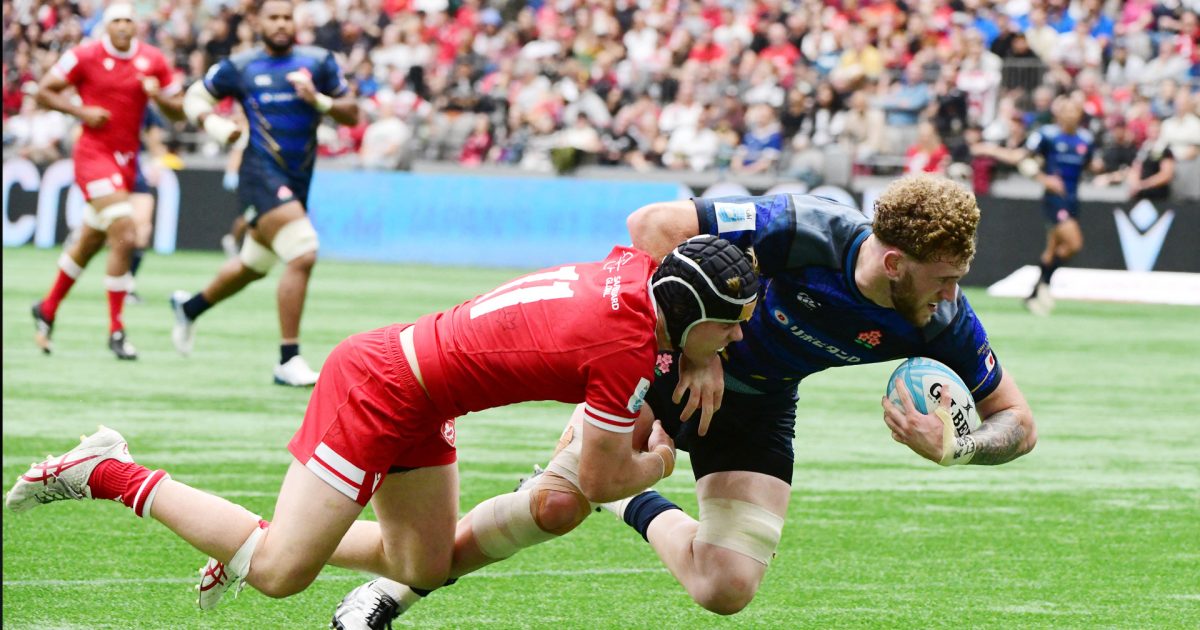Warner Dearns stars as Canada left shellshocked by Japan's 'Cho-soku Rugby'

In their opening match of the Pool B Asahi Super Dry Pacific Nations Cup 2024, Japan secured a 55-28 victory over Canada at BC Place, Vancouver, marking their first test win under Eddie Jones’ administration.
Japan secured the win by banking on their first-half points, achieving a 55-28 victory in their opening pool match.
Although Canada’s hopes of ending their losing streak against Japan since June 2013 fell short, their visible fighting spirit in the second half kept Japan away from their try line, making the victory hard-earned.
Soon after kickoff, Japan’s renowned “Cho-soku Rugby,” known for its high-speed play, began to shine as scrum-half Fujiwara consistently drove the tempo from their half.
Struggling to keep up, the Canadian team conceded territory through penalties, allowing Japan to attack without pressure. This eventually created space for wing Malo Tuitama to score his debut try.
Japan’s forward pack maintained the momentum, with Dearns scoring the team’s second try and putting Japan ahead 14-0 within ten minutes of kickoff. The high-speed attack continued with Shimokawa’s try, created by Tuitama’s line break on the right and full-back Yazaki’s setup, extending Japan’s lead to 21-0.
With Dearns scoring his second try in the game and the McCurran-Riley mid-field duo showcasing their line-break ability, Japan extended the lead to 38-0.
Canada, looking to regain momentum, responded with a determined kick chase by wing Coe, capitalizing on Japan’s handling error. Their efforts were rewarded with a
successful kick, closing the score to 38-5 and demonstrating their resilience as the first half ended.
As the second half began, Dearns once again spotted a try-scoring opportunity alongside Shimokawa, setting up Lee to get the job done and extend the lead to 45-7.
Although it seemed Japan would dominate the rest of the game, Canada demonstrated their physical superiority near the goal line, applying pressure on Japan and signaling the start of their comeback.
Following a turnover at the breakdown from the kickoff, Canada pressured Japan in their corner. The revitalized forward pack executed a desperate pick-and-go, with captain Rumball powering over for a try, reducing the score to 45-14. In the 50th minute, Canada capitalized on a maul, with hooker Quattrin and center (Talon).
McMullin catching Japan off-guard at the back of the line-out, allowing Canada to close the gap to 45-21.
Facing a challenging situation, Japan sought to break the negative momentum by substituting half-back duo Koyama and team captain Tatekawa with 17 minutes left in the game. Naikabula then halted Canada’s comeback with a try from a counter-attack, showcasing his skills and extending the lead to 50-21.
However, Canada’s fighting spirit remained unbroken. Gaining an advantage five metres from the goal line, half-back Nelson spotted space behind the defence and executed a clever kick, allowing (Takoda) McMullin to score and keep the home crowd buzzing with excitement. The match, which saw both teams appear markedly different from the first half to the second, seemed destined to end with Canada’s determined try.
Yet, substitute wing Osada found an opportunity to counter Canada’s second-half comeback with a crucial intercept try, allowing Japan to secure the victory. Despite the win, Japan was left with clear challenges to address in their defensive work.
The game served as a valuable lesson for Japan’s young team, highlighting the importance of delivering a consistent performance throughout 80 minutes on the
international stage.
Team captain Tatekawa, returning for his first away test match in 6 years and 9 months, reflected on the game, stating, “We had a positive start and scored a couple of tries, but we couldn’t control the entire match. There are areas we need to improve, so for the next game against the USA, we want to control and dominate the whole game.”
Japan head coach Eddie Jones, securing his first test match victory since his return, reflected on the team’s progress, saying, “We were pleased with the first half; we played with a lot of purpose.
“However, they’re still finding their feet in Test rugby, and we’re disappointed with the second half. With a squad of around 140 caps, each step is a step
forward for us.”
Although Canada ultimately lost, their relentless second-half effort and unwavering spirit kept Japan under constant pressure, making the away victory far from
straightforward.
Captain Rumball, reflecting on their strong second-half comeback, expressed hope for the program: “I’m proud of the boys for their response. I told them in the huddle that we were a bit shell-shocked initially, but we managed to address it during the game, which is promising for us.”
Canada head coach Jones expressed disappointment with the first half but praised the team’s effort in the second half, “They’re a top team with one of the best coaches in the world, so we were up against a really good side. The fast start really hurt us, but it was great to see our character come through in the second half in front of the home crowd.”
Next Sunday, Canada will face the USA in California, while Japan will host the USA at home in Kumagaya on September 7 (Saturday).










































































